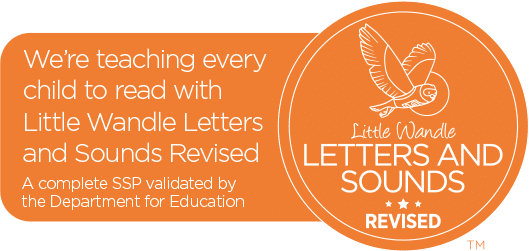Phonics at Bishop Ellis
At Bishop Ellis, we believe that all our children can become fluent readers and writers.
This is why we will teach reading through Little Wandle Letters and Sounds Revised, which is a systematic synthetic phonics programme (SSP).
We beginning teaching phonics in Reception and follow the Little Wandle Letters and Sounds Revised Progression (see link below), which ensures children build on their growing knowledge of the alphabetic code, mastering phonics to blend for reading and segment for spelling as they move through school.
Children continue their Little Wandle journey in Year 1, whereby they ‘Grow the Code’ and learn that there are graphemes that have different sounds. We continue to give children the opportunity to practice blending for reading and segmenting for spelling including these new graphemes.
Throughout Reception and Year 1, children are regularly assessed and become part of regular individual or group ‘keep up’ sessions to provide more repeated practice where necessary to ensure that the alphabetic code is embedded and applied.
Tricky Words
Although almost all words can be decoded using the alphabetic code, there are a few words with unusual spellings which children need to read and write a lot. We call these Tricky Words. Through Little Wandle Letters and Sounds Revised, we teach the reading and spelling of tricky words in order of frequency (see the progression document below). Where there are unusual spellings, we ensure we teach what makes the words tricky. For example: in ‘was’ the a makes an /o/ sound and the s makes a /z/ sound.
We strive to support our children to become confident and fluent readers by the end of year 1 and as a result, all of our children will be able to tackle familiar and unfamiliar words as they read.
The Year 1 statutory Phonics Screening Check
At the end of year 1, children undertake the phonics screening check. This is a statutory requirement of all children in England. It is done on a 1:1 basis with your child’s teacher or a familiar adult in school. The check is made up of 40 real and nonsense words which children read using their knowledge of phase 2-5 sounds. The check is designed to give both teachers and parents information about how your child is progressing in phonics. The pass mark is set every year nationally and is usually around 32 correct answers out of 40. If children do not pass, do not worry, the children will receive more support during year 2 and will re-take the check the following year.
Year 2 and above.
Children from Advent 2 term in year 2 to year 6 will have at least 3 discrete spelling lessons a week which will cover the national curriculum spelling rules. All children will be given discrete lessons to support their understanding of spelling rules as well as covering the common exception words. Children who need to continue with discrete phonics sessions will continue to do so.


